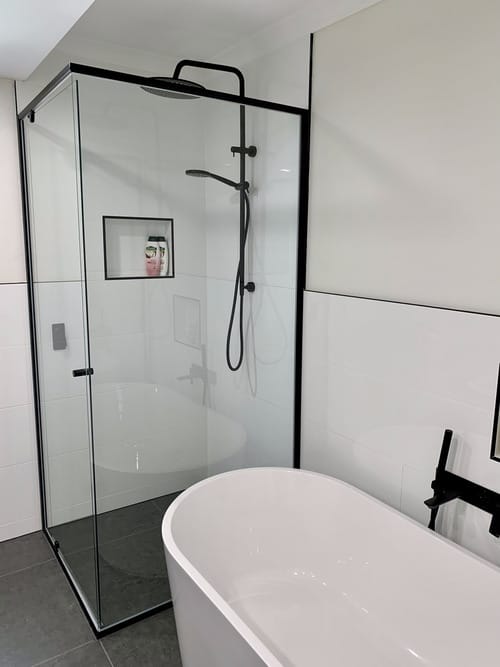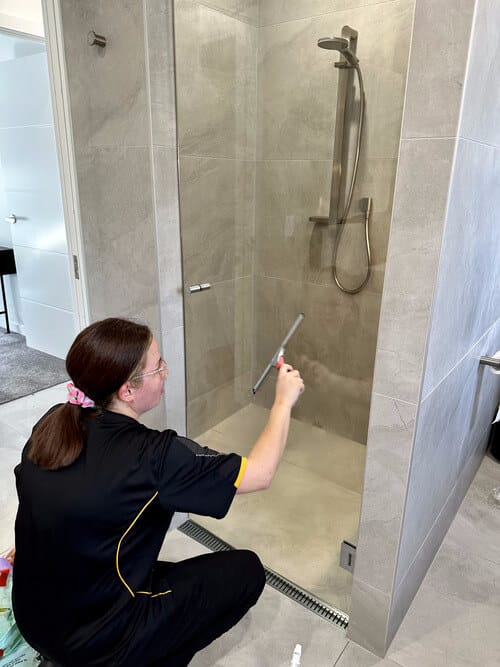Even the cleanest bathrooms can be let down by shower glass streaked with water spots and soap scum. These marks can quickly turn a well-kept space into one that seems overlooked.
Maintaining clear shower glass is essential and more engaging than your typical household task — it’s an art.
Our toolkit swaps out the artistic for the practical: a spray bottle, a sponge, your chosen glass cleaner, rubber gloves, and a few microfibre cloths.
With these in hand, we’re ready to tackle the task efficiently and effectively.
How Often to Clean Glass Shower Doors
A clear shower door is the centrepiece of a clean bathroom. To keep it pristine, you should clean your glass shower door once a week.
If you live in an area with hard water, consider increasing this frequency to combat the faster buildup of mineral deposits.
Regular cleaning prevents the accumulation of grime and keeps your bathroom looking fresh and inviting.
Why Does Shower Glass Get Dirty?

Shower glass gets cloudy primarily because of hard water, soap scum and mildew.
- Hard water contains minerals that leave unsightly white streaks and spots on glass shower doors.
- Soap scum forms from the fatty acids in soap mixing with minerals in water.
- Mildew, on the other hand, thrives in the warm, moist environment of a shower and bathroom.
The Best Tools for Cleaning Shower Glass

Finding the best cleaning approach depends on the type of grime you’re dealing with and whether you prefer commercial or natural cleaning solutions.
The best cleaning solution for glass showers
For an all-around cleaner, a mixture of white vinegar and water is highly effective for most soap scum and water stains.
Koala Eco has a natural glass cleaner made of organic and non-toxic ingredients. This is the best choice if you’d rather not smell like white vinegar throughout the cleaning process.
For more stubborn grime, commercial glass cleaners can offer additional strength. Brands like Windex are popular but must be used in a well-ventilated space.
The best tools to clean glass shower doors

After settling on a cleaning solution, you’ll need a few more things to get a glass shower screen nice and clean again.
- A squeegee
- Rubber gloves
- A few microfibre cloths
- A non-abrasive sponge or brush
- An old toothbrush or small brush (to clean shower door tracks)
- Optional: Goggles or protective eyewear if your eyes are sensitive to fumes
Daily Maintenance
A little effort goes a long way in keeping your shower glass clear. After each use, squeegee the glass to remove water droplets.
Leaving the shower door slightly open encourages ventilation and reduces moisture buildup, discouraging mildew growth.
Spraying the glass with a vinegar and water solution daily can prevent soap scum buildup.
How to Deep Clean Your Shower Glass

A sparkling, clean glass shower can transform the entire feel of your bathroom.
While it may need some elbow grease, the results are worth it.
Here are four effective options:
Option 1: Use a white vinegar solution
White vinegar is not just for cooking; its acidic nature makes it one of the best defenders against grime.
Mix equal parts white vinegar and water in a spray bottle to make a DIY cleaning solution. Generously spray the solution onto the shower glass, allowing it to sit and work its magic for about 10 minutes.
Afterwards, steady yourself by firmly placing your palm on the edge of the shower glass and then wiping it with a microfiber cloth.
If the shower screen has a door handle, you can opt to hold it instead for more support.
This way, you’ll prevent further smudges and reveal a cleaner surface. Finish the deep cleaning process by rinsing with water to remove any lingering vinegar smell.

Option 2: Use baking soda
If white vinegar isn’t enough, go for baking soda (or sodium bicarbonate). Its gritty texture makes it perfect for scrubbing away stubborn stains.
Mix baking soda with water to create a thick paste. Spread this paste over the glass, targeting the stubborn areas, and let it sit for about 15 minutes.
Gently scrub the glass in a circular motion using a non-abrasive sponge or brush, then rinse thoroughly. The grime will lift away as you rinse.
Option 3: Use lemon juice
Lemon juice is another kitchen staple that offers a natural and fragrant way to clean and refresh your shower doors. Its acidity helps dissolve hard water stains and soap scum.
Cut a lemon in half and rub it directly onto the glass, squeezing slightly to release the juice. Allow the lemon juice to act for a few minutes, then rinse with warm water.
Option 4: Use commercial cleaning solutions

Sometimes, the convenience and power of commercial cleaning solutions are unmatched. This is especially true for very stubborn stains or when you’re short on time.
Look for cleaners specifically designed for shower glass. Follow the product’s instructions carefully.
They usually involve spraying the cleaner onto the glass, waiting a few moments, and then wiping or scrubbing away the grime.
Always wear protective gloves to protect your skin from harsh chemicals.
How to Clean Glass Shower Door Tracks
The tracks of glass shower doors are notorious for collecting water, soap, and grime, allowing mould and mildew to grow if not cleaned regularly.
Mix equal parts white vinegar and hot water, then pour or spray this solution into the tracks.
Let it soak for 30 to 60 minutes to loosen the buildup.
Then, take an old toothbrush or a small cleaning brush to scrub inside the tracks, reaching into the crevices and corners.
Flush the tracks with warm water and dry with a cloth to prevent new water spots from forming.
How Can I Make My Shower Glass Clear Again?

Cloudy shower glass detracts from the cleanliness of your bathroom.
Here’s how you can get your shower screens clear again and keep your bathroom looking its best.
Deep clean glass showers to remove hard water stains
Hard water stains can be particularly challenging to remove because they are mineral deposits left after water evaporates.
Start with spraying a solution of half vinegar and half water directly onto the stains. Allow it to sit for 10 to 15 minutes to break down the minerals.
If the stains persist or you have stubborn limescale on your shower screen, apply a paste made from baking soda and white vinegar, then let it sit for another 15 minutes.
Gently scrub away the cleaning solution with a soft, non-abrasive sponge. Rinse the glass with water and admire your work.
Repeating the process or allowing the cleaning solution to sit longer can help treat stubborn hard water stains.

Preventing hard water stains
Investing in a water softener can significantly reduce hard water stains if you live in a hard water area.
Regularly cleaning your shower and glass doors and using a shower spray after each use can prevent grime buildup.
Consider applying a rain-repellent product designed for car windshields to your shower glass; it can help water bead and roll off, reducing water spots.
Finishing touches

After cleaning, dry the shower screen with a squeegee or microfibre cloth.
Using a cloth lets you buff the glass and remove any fingerprints or other marks.
FAQs About Keeping Your Shower Glass Clean
Can I use bleach on my shower glass?
No! Bleach is not recommended for shower glass. While it may seem like a strong cleaning agent, bleach can be too harsh for the glass and its surrounding materials.
It’s better to stick with gentler, non-abrasive solutions like white vinegar or a pH-neutral cleaner designed for glass.
How do I prevent water stains on shower doors?

Preventing water stains starts with regular maintenance. After each shower, remove excess water on your glass by using a squeegee.
This simple step drastically reduces the likelihood of water spots and mineral deposits. Applying a water-repellent treatment can also help water bead off the glass, further minimising stains.
Can white vinegar damage shower seals?
Yes, over time, white vinegar’s acidic nature can degrade the silicone or rubber seals around your shower door.
To minimise this risk, use vinegar sparingly and always rinse the areas thoroughly with water after cleaning.
It’s good practice to apply vinegar directly to the glass rather than spraying it near the seals.
Do I really need to use a spray bottle?
While not strictly necessary, a spray bottle can make cleaning more efficient and effective.
It allows even distribution of your cleaning solution over the glass surface, minimising waste and ensuring thorough coverage.
For those preferring minimal tools, applying the solution with a cloth is also viable, though it may require more effort to achieve even coverage.
Clean Shower Screens Equal a Well-Maintained Home
The effort you put into keeping your shower doors transparent reflects your dedication to preserving the beauty and hygiene of your entire home.
But if you can’t put in the elbow grease or feel that cleaning shower doors is beyond you, there are always local cleaners you can rely on.
They know how to properly clean shower glass and make the rest of your property look spick-and-span along with it.
Just make sure not to leave out the regular shower maintenance in between deep cleans!

